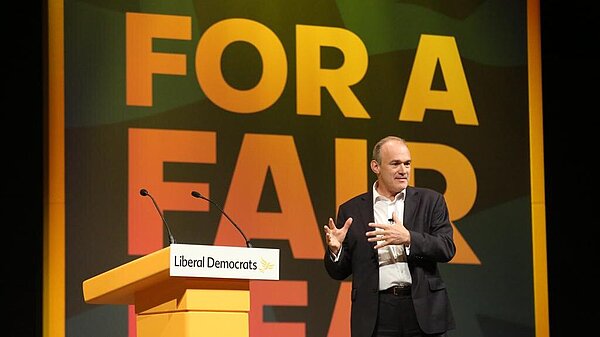Getting Emergency Care Back on Track
F8 - Policy Motion
Chair: Callum Robertson; Aide: Jennie Rigg; Hall Aide: Cllr Simon McGrath.
Motion as passed by conference
Conference notes that:
- The NHS’s emergency care services, from ambulance response times to Accident and Emergency (A&E) waiting times, are under intolerable and unsafe pressure, risking the lives of thousands each year.
- In 2024/25 in England, around 532,000 patients waited over 12 hours in A&E from decision to admit to admission, a 21% rise from last year and a nearly 20–fold increase over five years.
- Corridor care is now routine, with 80% of physicians reporting they were forced to treat patients in unsafe spaces this winter.
- Evidence from the Lancet and others suggests that those from ethnic minority backgrounds are more likely to face disparities in treatment by the ambulance service, and that this risks worse outcomes than their white peers.
- Over the past seven years, the Government has spent an average of £376 million of emergency funding each year to tackle the NHS winter crisis.
- Ambulance response times often fall below national standards, resulting in life–threatening delays.
- Air ambulances operate as charitable services and face chronic underfunding despite their critical role in saving lives, particularly in rural and remote areas.
- A quarter of avoidable hospital admissions in patients over 75 are attributed to the decline in the health of an unpaid carer.
- Where carer specific services have been introduced by local hospitals and Integrated Care Systems, working in partnership with local carer support organisations, there has been a tangible impact on admissions and carer health and wellbeing.
- NHS staff face burnout and unmanageable workloads, risking patient safety in emergency care settings.
Conference believes that:
- Everyone deserves access to timely, safe, and high–quality emergency care, regardless of the time of year or where they live, or their ethnic background.
- After years of Conservative mismanagement, our NHS has been left on its knees, with shocking practices like corridor care, where patients are left waiting on trolleys without dignity, safety, or proper attention, becoming dangerously normalised.
- Chronic winter crises are not inevitable but the result of poor planning, underfunding, and neglect and result in emergency Government top–ups year after year.
- Ambulance services, air ambulances and emergency infrastructure are lifelines that should be recognised and protected.
- Longer waiting times for ambulances have a severe knock–on effect on people’s health.
Conference reaffirms calls to:
- Provide national, high–quality social care to all who need it, preventing delayed discharges and freeing up A&E beds.
- Guarantee routine GP appointments within seven days, or 24 hours for urgent cases, to reduce unnecessary A&E visits.
- Improve early access to mental health support with community walk–in hubs to prevent severe crises in A&E.
- Create a £50 million–a–year emergency fund, to allow ambulance trusts to reverse closures of community ambulance stations and cancel planned closures.
- Publish accessible, localised reports of ambulance response times.
- Launch a campaign to retain, recruit and train paramedics and other ambulance staff.
Conference calls on the Government to:
- Ensure that our emergency care system has the staff it needs by:
- Creating a dedicated accident and emergency care workforce plan.
- Publishing a national strategy to ensure all emergency departments meet or exceed ‘good’ safety standards as assessed by the Care Quality Commission (CQC), with a report on implementation progress laid before Parliament annually.
- Reduce pressure on A&E departments through effective triaging of patients by:
- Ensuring every A&E waiting room has a qualified clinician to monitor patients and every 111 call centre has a clinical manager on shift to rapidly assist with complex cases.
- Rolling out mental health crisis centres nationally with urgency to prevent a postcode lottery of proper mental health crisis response.
- Guaranteeing that all 111 calls are answered within three minutes, by automatically transferring unanswered calls to other ambulance trusts and providers, following the same process as 999 calls.
- End the postcode lottery on emergency care by:
- Classifying all NHS ambulance hubs as critical infrastructure to prevent closure or downgrading without a full public consultation and ministerial sign–off.
- Launching a national drive for more Community First Responders in rural areas, equipping them with skills to save lives.
- Introducing a national commissioning framework to integrate air ambulance services into the NHS emergency response system while allowing them to retain their fundraising activities as charities.
- Re–establish the cross–party talks on social care, finish the Casey review within a year, and urgently implement the reforms.
- Ensure that this winter crisis is the last by launching a new Winter Taskforce, which would manage a ring-fenced fund over the next four years, to build resilience in A&E departments and ambulance services during peak seasons.
- Commit to ending corridor care by the end of this Parliament so patients do not have to continue to suffer in undignified and unsuitable conditions.
- Ease pressures on family carers of all ages, reduce avoidable hospital admissions and readmissions, and reflect the crucial role unpaid carers play in planning for winter pressures by establishing a carers liaison service in every hospital trust, developed with local carer support organisations which:
- Identifies family carers, including young carers.
- Checks the wellbeing of carers.
- Develops, with each carer, tailored support plans.
- Involves carers in the discharge process, and ensures they are properly supported when the person they care for returns home.
- Develops Carer Intensive Support teams to provide crisis intervention.
- Commit to ending racial inequalities in the ambulance service, as part of an NHS-wide strategy to eliminate racial inequalities throughout the NHS – this begins with clear, regular and consistent data collection across the NHS.
Applicability: England.
Motion Prior to Amendment
Submitted by: 12 party members
Mover: Helen Morgan MP (Spokesperson for Health and Care).
Summation: Danny Chambers MP (Spokesperson for Mental Health).
Conference notes that:
- The NHS’s emergency care services, from ambulance response times to Accident and Emergency (A&E) waiting times, are under intolerable and unsafe pressure, risking the lives of thousands each year.
- In 2024/25 in England, around 532,000 patients waited over 12 hours in A&E from decision to admit to admission, a 21% rise from last year and a nearly 20–fold increase over five years.
- Corridor care is now routine, with 80% of physicians reporting they were forced to treat patients in unsafe spaces this winter.
- Over the past seven years, the Government has spent an average of £376 million of emergency funding each year to tackle the NHS winter crisis.
- Ambulance response times often fall below national standards, resulting in life–threatening delays.
- Air ambulances operate as charitable services and face chronic underfunding despite their critical role in saving lives, particularly in rural and remote areas.
- NHS staff face burnout and unmanageable workloads, risking patient safety in emergency care settings.
Conference believes that:
- Everyone deserves access to timely, safe, and high–quality emergency care, regardless of the time of year or where they live.
- After years of Conservative mismanagement, our NHS has been left on its knees, with shocking practices like corridor care, where patients are left waiting on trolleys without dignity, safety, or proper attention, becoming dangerously normalised.
- Chronic winter crises are not inevitable but the result of poor planning, underfunding, and neglect and result in emergency Government top–ups year after year.
- Ambulance services, air ambulances and emergency infrastructure are lifelines that should be recognised and protected.
- Longer waiting times for ambulances have a severe knock–on effect on people’s health.
Conference reaffirms calls to:
- Provide national, high–quality social care to all who need it, preventing delayed discharges and freeing up A&E beds.
- Guarantee routine GP appointments within seven days, or 24 hours for urgent cases, to reduce unnecessary A&E visits.
- Improve early access to mental health support with community walk–in hubs to prevent severe crises in A&E.
- Create a £50 million–a–year emergency fund, to allow ambulance trusts to reverse closures of community ambulance stations and cancel planned closures.
- Publish accessible, localised reports of ambulance response times.
- Launch a campaign to retain, recruit and train paramedics and other ambulance staff.
Conference calls on the Government to:
- Ensure that our emergency care system has the staff it needs by:
- Creating a dedicated accident and emergency care workforce plan.
- Publishing a national strategy to ensure all emergency departments meet or exceed ‘good’ safety standards as assessed by the Care Quality Commission (CQC), with a report on implementation progress laid before Parliament annually.
- Reduce pressure on A&E departments through effective triaging of patients by:
- Ensuring every A&E waiting room has a qualified clinician to monitor patients and every 111 call centre has a clinical manager on shift to rapidly assist with complex cases.
- Rolling out mental health crisis centres nationally with urgency to prevent a postcode lottery of proper mental health crisis response.
- End the postcode lottery on emergency care by:
- Classifying all NHS ambulance hubs as critical infrastructure to prevent closure or downgrading without a full public consultation and ministerial sign–off.
- Launching a national drive for more Community First Responders in rural areas, equipping them with skills to save lives.
- Introducing a national commissioning framework to integrate air ambulance services into the NHS emergency response system while allowing them to retain their fundraising activities as charities.
- Re–establish the cross–party talks on social care, finish the Casey review within a year, and urgently implement the reforms.
- Ensure that this winter crisis is the last by launching a new Winter Taskforce, which would manage a ring-fenced fund over the next four years, to build resilience in A&E departments and ambulance services during peak seasons.
- Commit to ending corridor care by the end of this Parliament so patients do not have to continue to suffer in undignified and unsuitable conditions.
Applicability: England.
Amendments
Drafting Amendments
The FCC has agreed to make the following drafting amendments to the motion:
After ii) (line 8), insert:
iii) Evidence from the Lancet and others suggests that those from ethnic minority backgrounds are more likely to face disparities in treatment by the ambulance service, and that this risks worse outcomes than their white peers.
At end of I. (line 24), insert: ‘..., or their ethnic background.’
After 6. (line 89), add:
7. Commit to ending racial inequalities in the ambulance service, as part of an NHS-wide strategy to eliminate racial inequalities throughout the NHS – this begins with clear, regular and consistent data collection across the NHS.
Amendment One
PASSED
Submitted by: 12 members
Mover: Andy McGowan
Summation: Lee Dargue
After vii). (line 20), insert:
viii) A quarter of avoidable hospital admissions in patients over 75 are attributed to the decline in the health of an unpaid carer.
ix) Where carer specific services have been introduced by local hospitals and Integrated Care Systems, working in partnership with local carer support organisations, there has been a tangible impact on admissions and carer health and wellbeing.
After 6. (line 89), insert:
7. Ease pressures on family carers of all ages, reduce avoidable hospital admissions and readmissions, and reflect the crucial role unpaid carers play in planning for winter pressures by establishing a carers liaison service in every hospital trust, developed with local carer support organisations which:
- Identifies family carers, including young carers.
- Checks the wellbeing of carers.
- Develops, with each carer, tailored support plans.
- Involves carers in the discharge process, and ensures they are properly supported when the person they care for returns home.
- Develops Carer Intensive Support teams to provide crisis intervention.
Amendment Two
PASSED
Submitted by: 13 members
Mover: Ellen Nicholson
Summation: To be announced
After 2. b) (line 68), insert:
c) Guaranteeing that all 111 calls are answered within three minutes, by automatically transferring unanswered calls to other ambulance trusts and providers, following the same process as 999 calls.



